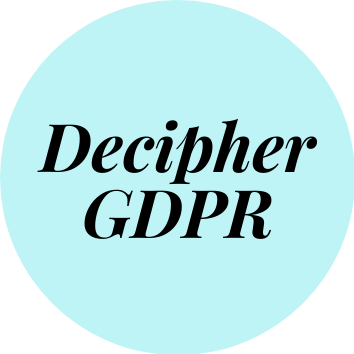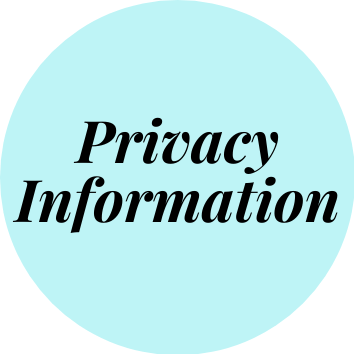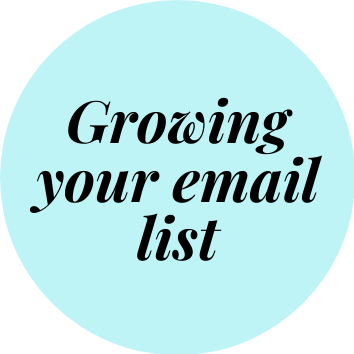This Course is for those selling Business to Consumer (B2C)
Only £49
Have you asked these questions?
Do I need to apply the double opt in for new people signing up to my list?
Do I need to use the GDPR element in my email marketing software?
Can I add customers to my mailing list?
Will I have to get re-consent for those on my list?
Here’s how you can confidently grow your list and use email marketing which is GDPR compliant in just 5 easy steps
Small businesses are continually told by marketing experts that they need to grow their list, get more engagement and build relationships with  current and potential customers. Easier said than done when you are not sure where to start. We all know, that to be able to grow your list, you need to understand how data protection affects the way you can do that but it has to be explained in a simple to understand way.
current and potential customers. Easier said than done when you are not sure where to start. We all know, that to be able to grow your list, you need to understand how data protection affects the way you can do that but it has to be explained in a simple to understand way.
You already know that growing your mailing list helps grow your business but you also know that GDPR changed the criteria and there is lots of confusion about email marketing. Getting it wrong can mean complaints, an Information Commissioner’s Office (ICO) investigation and a whole load of hassle that you really don’t want or need.
We’ve heard of many people who deleted their email list because they didn’t know if it complied with GDPR. Others who took down sign up pages because someone told them they weren’t data protection compliant. Think of the time and effort you put into growing your list, only to have huge doubts about whether you are getting it right, worries about complaints and of getting it wrong and a huge fine that your business just can’t afford.
This course will help you by providing you with all the information and support to get it right, freeing you from niggling worries or the stress of feeling you are not doing it right, let alone the issue of complaints when you are not getting it right. We’re here to help you along the way.
Here’s what you might not know.
There are two pieces of legislation that manage email marketing – data protection legislation and e-privacy legislation. You need to be complying with both.
Not all email marketing software is GDPR compliant – can you tell if yours is?
With the right process in place, you can grow and engage with your list whilst being confident that you are complying with the legislation.
Everyone tells you building your list is an important part of building your business, but its so much harder to know whether you are complying with the data protection requirements than you think it should be.
You have wanted to get it right and you’ve tried to decipher the legislation by looking at the Information Commissioner’s Office (ICO) Website and not been able to easily understand what you need to do. It doesn’t address your situation or give you the answers you want in an easy to understand way.
You may have asked questions on Facebook forums or elsewhere and got a whole range of different answers which has just confused you further.
You may have received complaints from people who are on your list that you are not complying with the law and because you don’t understand what you need to do, you take the sign up page down or panic that they are going to complain to the ICO.
That all changes now. This course is in easy to understand language and there is the bonus of a Q&A forum and a monthly call with a qualified data protection officer.
What can you expect from this course?
- It will provide clarity about how you can use personal information for marketing
- It’ll tell you how to get the best out of email marketing software like Mailchimp
- You’ll create a process you can follow again and again with confidence
- The whole course is in easy to understand language
- There is a Q&A forum for when you get stuck
- You can revisit the modules as frequently as you need to
- Updated content to reflect the latest legal changes (and with Brexit who knows what they will look like ?)
- You can be confident that you are creating a mailing list in line with best practice and data protection legislation
- Monthly Q&A call to answer your email marketing questions.
What does the course cover?

One of the first things we’ll cover are the basics of GDPR and data protection legislation related to email marketing. It’s in easy to understand language and won’t send you to sleep (hopefully!).

We’ll look at email marketing packages such as Mailchimp, Send in Blue (my personal favourite) etc and how they can help or hinder your GDPR compliance.

We’ll show you how to write simple privacy notices to go with your email campaign. Providing easy to understand information at the right time.

Learn how you can grow your list effectively by finding out who you can add to it and when, how to use lead magnets, and whether you need to have the double opt in activated.

Finally we will put it all together in a process which you can easily follow and replicate.

You’ll get all of this PLUS a free monthly webinar to address any questions and we’ll keep the content updated as the law changes (think how Brexit may impact this).
About Lesley Cooley – your course leader
Lesley Cooley has over 25 years’ experience in process improvement combined with 15 years in data protection compliance. Lesley holds the respected ISEB Certificate in Data Protection and enjoys working with a range of organisations  to get the best practices for them in place. Lesley is a qualified accountant, a member of the Chartered Institute of Internal Auditors, and a Level 5 Institute of Leadership and Management coach and Mentor as well as an Institute of Risk Management qualified Risk Manager. In September 2018, Lesley also became a certified Information Security Management System Lead Auditor which means that she can audit to the ISO27001 standard (the international standard for security). Lesley is also a certified Change Management Practitioner so can help ease the introduction of new systems and working practices in an effective way. Her excellent communication skills and depth of knowledge means she can understand the priorities for an organisation and effectively communicate what needs to be done. Her ability to identify ways to improve processes and systems benefits organisations in creating time or money saving solutions.
to get the best practices for them in place. Lesley is a qualified accountant, a member of the Chartered Institute of Internal Auditors, and a Level 5 Institute of Leadership and Management coach and Mentor as well as an Institute of Risk Management qualified Risk Manager. In September 2018, Lesley also became a certified Information Security Management System Lead Auditor which means that she can audit to the ISO27001 standard (the international standard for security). Lesley is also a certified Change Management Practitioner so can help ease the introduction of new systems and working practices in an effective way. Her excellent communication skills and depth of knowledge means she can understand the priorities for an organisation and effectively communicate what needs to be done. Her ability to identify ways to improve processes and systems benefits organisations in creating time or money saving solutions.
